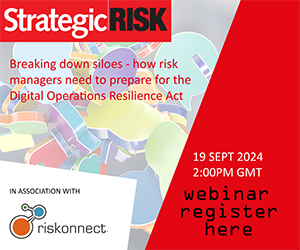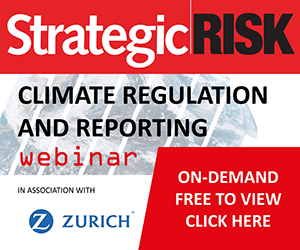Asia Pacific
Register for free with StrategicRISK
Unlock full access to award-winning journalism tailored for senior risk professionals. StrategicRISK goes beyond the headlines, offering in-depth analysis, exclusive case studies, and global insights designed to help you anticipate threats, shape strategy, and lead with confidence.
If you are already registered, please sign-in for access.
When disruption becomes ordinary: the global supply chain story of 2025
From geopolitics and cyber to climate and tariffs, 2025 proved that supply chain disruption is no longer episodic. It is embedded. Fresh research highlights the scale of losses and the resilience gap risk managers must now close.
Safety under strain: how digital ambition is outpacing operational reality in Australian workplaces
Despite significant investment in digital systems and AI, new Australian research suggests safety performance is being undermined by reporting friction, weak enforcement and uneven adoption. The challenge for leaders is not more tools, but closing the gap between strategy and frontline reality.
Converging risks push resilience and insurance up the board agenda
Beazley’s latest Risk & Resilience data suggests that risk categories once treated as separate are now overlapping, prompting companies to rethink how insurance and risk management fit into long-term strategy.
Shock after shock: Why risk leaders say climate resilience models are no longer fit for purpose
The compounding shocks created by climate change were the topic of our latest SR:500 roundtable. Organisations are being forced to reassess their long-held assumptions about resilience, continuity and operational risk as they navigate the road ahead.
Country spotlight: Learning from Malaysia renewed focus on risk as a strategic lever
Positioned at the intersection of Southeast Asia’s economic hopes and geopolitical tensions, Malaysia’s attitude to risk is also at a critical juncture. No longer just a compliance checklist, risk management is being seen as a tool to guide strategy and reshape resilience.
Country spotlight: key risks for businesses operating in Venezuela – and how to manage them
Political intervention, sanctions uncertainty and renewed competition over Venezuela’s vast natural resources have sharply altered the risk landscape for companies operating in the country or relying on Venezuelan supply chains. For risk managers, the challenge is no longer how to monitor Venezuela, but how to operate amid fast-moving political, legal ...
Sector focus: Banks and insurers caught between cyber threats and regulatory pressure
Banks are walking a narrowing tightrope as AI-enhanced cyber threats and growing regulatory demands pull in opposite directions. Financial risk managers must build agility to stay on their feet when, not if, they experience a cyber attack.
New world order fears rise as geopolitical and economic risks top business agenda
Businesses worldwide are reassessing strategy as geopolitical confrontation, economic fragmentation and technological disruption dominate the World Economic Forum’s Global Risks Report 2026, signalling a shift towards a more competitive and less predictable global system.
Cyber-enabled fraud overtakes ransomware as CEOs’ top cyber concern
Cyber-enabled fraud has overtaken ransomware as CEOs’ top cyber concern, according to the World Economic Forum’s Global Cybersecurity Outlook 2026, as AI-related vulnerabilities rise and resilience gaps widen across regions and organisations.
Global cooperation is fragmenting in ways risk managers need to understand
The World Economic Forum’s Global Cooperation Barometer 2026 suggests global cooperation is holding steady overall, but shifting away from multilateral systems towards smaller, interest-led coalitions. For risk managers, that evolution matters more than the headline score.
Case study: What the Fukushima water release reveals about risk perception and communication
Managing risk means managing perception, even when the two don’t align. Two studies reveal how the public saw the Fukushima water release as a ‘high-dread, low-controllability’ risk, and what we can learn about communication in such sensitive circumstances.
When the stabiliser becomes a variable: evaluating the U.S. as a geopolitical threat in 2026
As U.S.political and geopolitical behaviour breaks from decades of predictability, businesses and risk teams face a landscape where stability can no longer be taken for granted.
SR Q4 2025: What’s in a name?
And if it’s what you do that counts, what exactly should that be? We lay out the blueprints for tomorrow’s most effective risk leader and explore the attributes and approaches needed to take on 2026.
From silos to strategy: how boards are rethinking risk
Webinar: With boards more engaged, our next mission is clear: offer a wide-angle lens on how risks interact, and why risk management and opportunity can co-exist. Our panellists share candid insights on how to turn silos into the strategies a board wants to see.
Breaking point: why ageing infrastructure is becoming a critical risk for developed economies
Ageing infrastructure in developed economies is the silent, but spreading, decay all around us, threatening lives, businesses and economies. We must act before, not after, catastrophe hits.
Embed geopolitics into strategy as tariff era reshaping global trade, Willis warns
Political risk report from WTW says US tariff deals are redrawing alignments and creating a new risk environment for internationally exposed companies
Civil unrest risks set to intensify in 2026: what businesses need to know
New analysis points to rising protest size, more frequent disruption and growing damage to commercial property, with Europe and the US emerging at the highest risk of becoming SRCC flashpoints
Case study: How a risk control failure triggered a $3m loss in just six weeks
A routine cash-handling function turned into a multimillion-dollar loss when a misconfigured ATM enabled six weeks of fraudulent withdrawals. The case exposes deeper weaknesses in governance, data flows and assurance that allowed the incident to escalate unchecked.
Secondary perils: Why businesses must strengthen resilience as severe weather intensifies
Rising losses from floods, hail, wildfires and other under-recognised hazards show that secondary perils are no longer secondary. New data highlights the scale of the threat – and why risk managers need a more systematic, site-specific approach to resilience.
Sector spotlight: why universities must rethink risk in an era of disruption
Once defined by tradition, universities are now facing degrees of change that are forcing a fundamental rethink of how they fund themselves, how they manage student interests and their approaches to handling evolving technological threats.




























